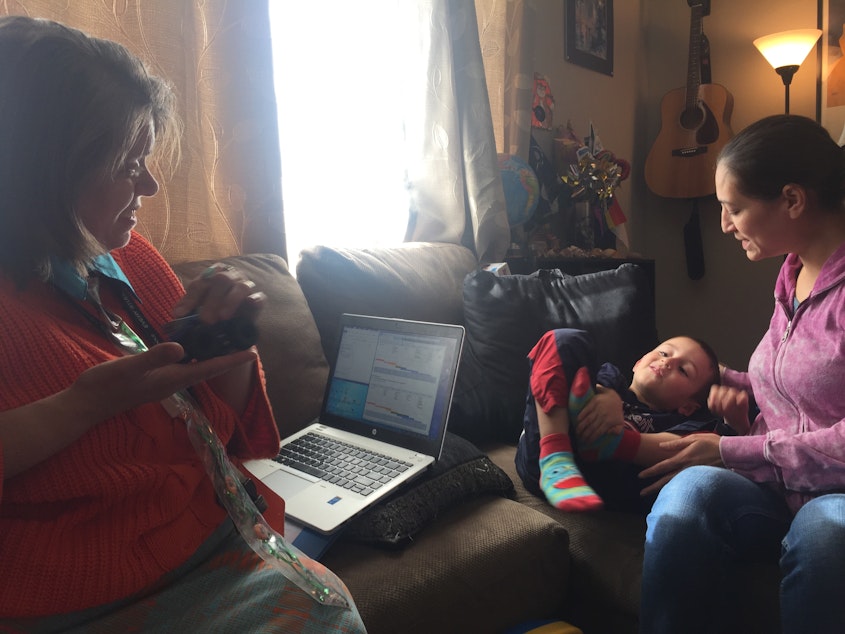Early learning program emphasizes teaching moments are everywhere, even in the syrup

On a sunny Saturday morning, a dozen moms and dads sat around tables in a White Center elementary school library, looking at a PowerPoint slide of a little boy pouring syrup on his pancakes.
"What do you think would happen if I said nothing at all? How much would he put on there?" asked speaker Kellie Morrill, director of the Educare of Greater Seattle P-3 campus.
"Way too much," the parents replied.
"So even though it’s really, really basic, there’s some math and measurement and prediction stuff that’s happening here, and you can verbalize that," Morrill said.
Finding educational opportunities in the quotidian moments of a child's day is one focus of Greenbridge Learning and Education Advocacy Baby Academy, a nine-week program of weekend classes in child development. The program is meant to show parents that education doesn’t begin at school — parents are their children’s first teachers.
Sponsored
In Highline School District, two-thirds of all students come from low-income families, and more than a quarter are still learning English. Those factors can hamper school readiness.
"Our youngest students needed additional supports if they were going to arrive at kindergarten with the skills they needed to be successful," said Anne Arnold, the district's director of early learning. Skills include the ability to count, recite the alphabet and share toys with their peers.
"There’s definitely a sense that schools will take care of things when they arrive, and [that] once children are there they’ll begin their education process," Arnold said. "And what we want to share with parents is that the first five years of that child’s life present a tremendous opportunity to impact the long-term success of that child."
With a grant from the Bill and Melinda Gates Foundation, the district partnered with the King County Housing Authority to identify families living in public housing in White Center with babies or babies on the way.
Highline invited those families to take part in the two-month baby academy, where they learn about ways to integrate learning experiences into every aspect of their children's days. That's followed by support for the first three years of their children’s lives.
Sponsored
The model is based on the Harlem Children’s Zone in New York City, which aims at providing cradle-to-career help and guidance for kids and their families.
Part of that support is home visits to check in with families and monitor children’s development. The goal is to catch any developmental delays early on.
On a recent morning, GLEA family advocate Camille Churchill sat in Angela Madrid’s living room with her one-year-old daughter, Yaffa, and four-year-old son, Moise.
Madrid is from Honduras, her husband is American. Churchill praised Madrid for regularly speaking to Moise in Spanish, even though his primary language is English.
"Sometimes I force him to speak in Spanish and he say, 'I’m sorry, I don’t understand what you meant.' He try! He say, 'How do you say it in Spanish, these words?'" Madrid said
Sponsored
She turned to her son. "See Moise, listen! She say you need to speak in Spanish."
Churchill chimed in. "Every person in this room speaks English," she said. "Only special people know Spanish, so you need to keep your Spanish."
Moise smiled and sighed.
Churchill asked Moise to show her the numbers he knows, to run and hop and skip around the room, and to repeat long words like sedimentary and ostracize. Moise did so perfectly.
"You guys have done an excellent job with his language," Churchill said. "He is giving me 10-word sentences. He has really good thought processes.”
Sponsored
Madrid smiled at her son and repeated what Churchill said — in Spanish.
For kids who are falling somewhat behind developmentally, the GLEA advocates give parents skill-building activities they can do with their kids. Children with more serious delays get referrals to agencies that help them get up to speed, often with home visits as well.
Madrid said she and her husband have learned a lot in the past year and a half they’ve been part of GLEA.
"How to teach them at a young age, what kind of games to play, and how important it is to play when they are young, too," Madrid said. "It's a really cool program."
Arnold said GLEA has been so popular that parents from other districts have asked to take part, too, although that isn't possible within the scope of the grant.
Sponsored
"We’ve had huge response to the program. We’ve had very significant participation amongst our community in the White Center area," Arnold said. The program is now expanding to another school in the neighborhood.
Arnold said the real test though will be several years down the road, when the children who entered the program as babies reach kindergarten.

